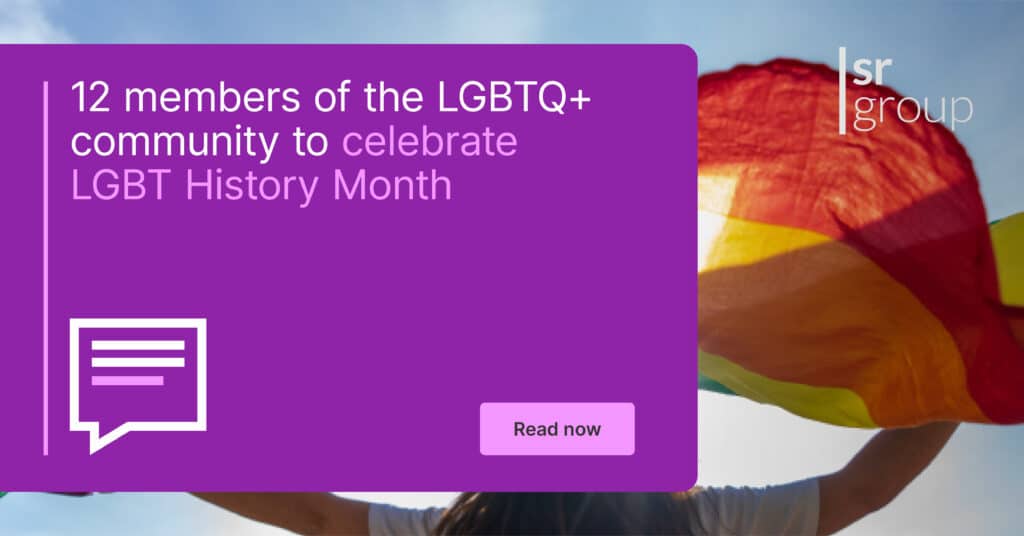12 members of the LGBTQ+ community to celebrate LGBT History Month

LGBT History Month is celebrated in the UK and Hungary in February and October in the US. The LGBTQ+ community has made a significant impact on our society, yet their history, experience and societal advancements are at times overlooked. This is why LGBT History Month was created to uplift and bring recognition. Of course, one occasion a year is not enough to celebrate progress – it should be acknowledged every calendar month. As such, we will be honouring one person each month of the year.
February | Rodney Wilson
Rodney Wilson was a school teacher in Missouri, USA credited with founding LGBTQ+ History Month. He created the event in 1994 to celebrate the contributions of LGBTQ+ people to society and to promote equality and inclusiveness. Wilson believed it was important to educate people about the history of the LGBTQ+ community and to provide a space to share their stories and lived experiences. LGBTQ+ History Month is now celebrated annually in different months in various countries worldwide. The event helps to raise awareness about the ongoing struggle for LGBTQ+ rights and to promote a more inclusive and accepting society for all.
March | Gilbert Baker
Gilbert Baker was an American artist, gay rights activist and designer of the rainbow flag. The rainbow flag was created in 1978 as a symbol for the gay and lesbian political movement, it was originally eight coloured stripes to represent a rainbow (a symbol of hope). Two colours were dropped due to a shortage in fabric, resulting in the six-colour rainbow most used today. Baker assigned a specific meaning to each colour: red for life, orange for healing, yellow for sunlight, green for nature, indigo for serenity and violet for spirit. Although it would have made him a lot of money, Gilbert refused to trademark his flag design, arguing it was a symbol for everyone. The flag has spread around the world and is now embraced as a symbol for those fighting for equal rights for the LGBTQ+ community. Baker’s flag has been the inspiration for many subsequent flags and the Progress Pride flag includes black and brown stripes to highlight the discrimination of black and brown members of the community and pink, light blue and white to represent transgender, non-binary, intersex, and those across the gender spectrum.
April | Magnus Hirschfeld
Magnus Hirschfeld was a German Jewish physician and sexologist who was a leading advocate for sexual minorities. In 1919 Hirschfeld founded the Institut für Sexualwissenschaft (Institute for Sexual Science) in Berlin, which was the first sexology research centre in the world. He also co-founded the Scientific Humanitarian Committee, the first LGBTQ+ rights organisation in the world to reform repressive anti-homosexual laws in Europe. Magnus is a pioneer of the modern LGBTQ+ rights movement with groundbreaking and often controversial work. However, he didn’t give up and persisted in advancing the rights of sexual minorities throughout his life. His legacy continues to influence the LGBTQ+ community and inspire activists across the globe.
May | Alan Turing
Alan Turing was an English mathematician who played a pivotal role in cracking the Nazi Enigma code during World War II and his work gave the Allies the edge they needed to win the war. It also led to the creation of the computer. Alan was arrested for homosexuality – which was illegal in Britain at the time. He was found guilty of “gross indecency” and underwent chemical castration as an alternative to prison. He sadly died a few years later at the age of 41. In 2013, Queen Elizabeth II signed a pardon for Alun’s conviction with immediate effect. This led to new legislation pardoning all gay men under historical gross indecency laws. This legislation is now informally called the “Alan Turing Law” which has gone on to secure pardons for over 75,000 other men and women convicted of homosexual acts. The impact of Alan Turing’s life and legacy will live on.
June | Harvey Milk
Harvey Milk is an American politician and gay rights activist. He was the first openly gay elected official in California. He fought for the rights of marginalised groups, including the LGBTQ+ community, racial minorities and the working class. Milk’s charismatic personality and passionate advocacy played a significant role in defeating Proposition 6, which aimed to ban gay and lesbian individuals from working in public schools. Tragically, his political career was cut short when he was assassinated in 1978. Milk’s legacy continues to inspire people worldwide and he posthumously became an icon in the gay rights movement. He is celebrated annually on Harvey Milk Day and was awarded the Presidential Medal of Freedom in 2009.
July | Sylvia Rivera
Sylvia Rivera was a Latina gay liberation and transgender rights activist and one of the most prominent figures of the modern LGBTQ+ rights movement. She participated in demonstrations with the Gay Liberation Front and was close friends with Marsha P. Johnson – who cofounded the Street Transvestite Action Revolutionaries (STAR), a group dedicated to helping homeless young drag queens, gay youth, and trans women. It was a safe space to discuss issues facing the transgender community in New York City. Sylvia pushed hard for the inclusion of queer and trans youth of colour. The Sylvia Rivera Law Project continues her legacy, working to guarantee “all people are free to self-determine their gender identity and expression, regardless of income or race, and without facing harassment, discrimination, or violence.”
August | Marsha P Johnson
Marsha P. Johnson was an African-American gay liberation, AIDS activist and drag queen. Her presence shined through New York City’s gay and art scene and modelled for Andy Warhol. The “P” in Marsha’s name stood for “Pay It No Mind” – which was her response when people questioned her gender. Marsha was a founding member of the Gay Liberation Front and cofounded STAR with Sylvia Rivera. Marsha and Sylvia were a dynamic duo who met in 1963. The two were actively involved in the Stonewall Inn uprising on June 28, 1969. The Stonewall Inn uprising was a turning point in the visibility of the gay rights movement. Marsha was also one of the first drag queens to go to the Stonewall Inn when they began allowing women and drag queens inside (previously a bar only for gay men). With Sylvia, they established STAR House, which became a shelter for homeless gay and trans youth in 1970. Her legacy continues with The Marsha P Johnson Institute, protecting and defending the human rights of BLACK transgender people.
September | Audre Lorde
Audre Lorde, an African-American writer, feminist, and LGBTQ+ rights activist, focused on intersectionality and the experiences of marginalized communities. Her poetry, such as “The Black Unicorn” and “Coal”, addressed social issues like race, gender, sexuality, and identity with powerful language. Lorde advocated for civil rights, self-expression, and supportive communities. She played a significant role in advancing LGBTQ+ rights, especially for lesbian and queer women of colour, and challenged systems of oppression through her writing, speeches, and activism. Audre Lorde’s impactful works continue to inspire discussions on social justice, making her a fearless trailblazer for marginalized communities’ rights.
October | Willi Ninja
Willi Ninja was an American dancer and choreographer considered the “Grandfather of Vogue”. He was featured in “Paris is Burning,” a film about LGBTQ+ culture in America in the 1980s and popularised vogueing across the country and overseas. He was also one of the earliest advocates of HIV and AIDS awareness. Ninja created the House of Ninja ballroom house, a combination of extended social family and dance troupe. It was known for its inclusive membership of all races and sexual orientations. Although Ninja has now passed away, his legacy remains. The House of Ninja continues to advocate for HIV and AIDS awareness. Ninja has inspired many artists, celebrities, LGBTQ, gender and performance studies for his nonconforming and transgressive gender expression as an artist.
November | Allan Horsfall
Often referred to as the grandfather of the gay rights movement for campaigning as an openly gay man when homosexuality was still illegal in the UK. His work helped to bring about the decriminalisation of male homosexual activity in 1967. The impact of that reform had wide-reaching social consequences and Allan is seen as one of the founders of both the gay movement and the gay community. In 1964, Allan Horsfall and a group of friends set up the North West Homosexual Law Reform Committee. He even gave out his home address as the base for the organisation. To be so open at that time was extremely brave. It became the first campaigning organisation outside of London set up and run by gay men, and its work directly led to homosexuality no longer being illegal. Later, the North West Committee was transformed into the campaign for Homosexual Equality (CHE), which was the largest LGBT organisation there has ever been in the UK, with more than 5,000 members and 120 local groups all over the country. Its role in the removal of the stigma of criminality from homosexuality remained his crowning achievement.
December | Josephine Baker
Entertainer, activist and memorable queer and Black icon, Josephine Baker shined on Broadway stages and vaudeville showcases. She relocated in 1925 to Paris to perform and was also a key member of the French Resistance movement during World War II, gathering intelligence for the forces of “Free France” led from London by General Charles de Gaulle. Baker also became the first African American woman to star in a motion picture and to perform with an integrated cast at an American concert hall. She was a prominent civil rights activist and refused to perform in American clubs that enforced segregation between Black and White audience members. Josephine continued to make history, during the March on Washington for Jobs and Freedom in 1968, where she was the only woman speaker. Josephine was bisexual before the term became widely used in the early 20th century. She challenged stereotypes and broke biases throughout her life.
“You are on the eve of a complete victory. You can’t go wrong. The world is behind you.”
Josephine Baker
December marks the last member of the LGBTQ+ community to celebrate LGBT History Month, we hope you enjoyed our series. Check out our #ComingOutSeries.


